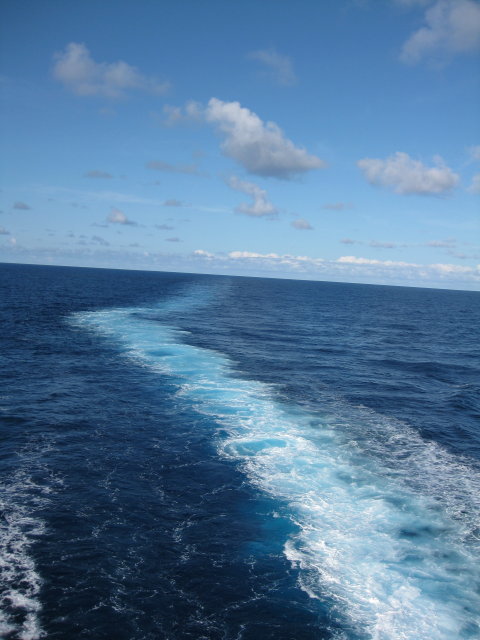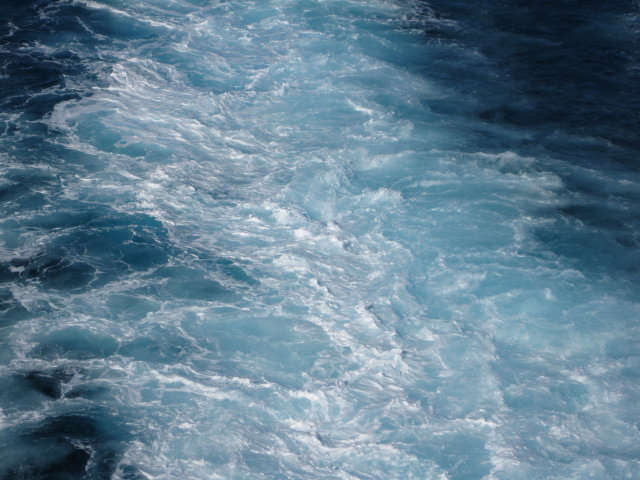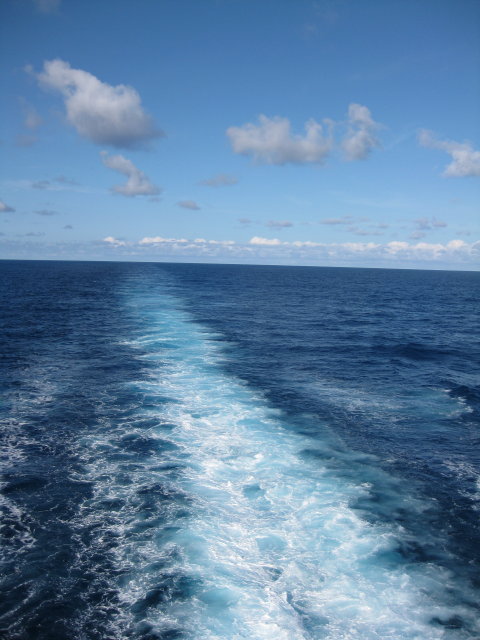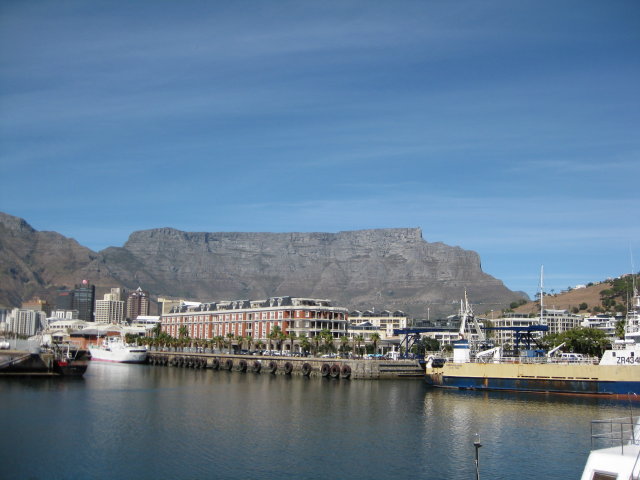The weather is turning as we approach the continent of Africa and see land again. The tropical temperatures of the last few countries give way to the Southern Hemisphere’s temperate early fall on our way southwest to Cape Town in South Africa. There are large flocks of seabirds that surround the ship, especially Gannett gulls, and many pods of dolphins within viewing distance. When we round the Cape of Good Hope we go from the warm Indian Ocean to the much colder Atlantic Ocean. Much more wind rocks the boat but also seems to keep the skies as clear as a bell.
Instead of avoiding the hot outdoors, I now take every opportunity to get a few minutes out in the refreshing weather. If I needed proof that the ship’s crew keeps a close watch up on the bridge, I have it when I get a photo of the ship avoiding a barrel floating past in the ocean. Our wake goes from a straight line to a zig-zag without the least disturbance for anyone who doesn’t actually see it happen.
We’re approaching the final month of our voyage and beginning to think about what needs doing on a practical level and what bears thinking about to mentally round-out this voyage.
I went to Kenya many years ago so I’m not joining the many people who are going on safari into the game lands at considerable cost. Instead, I’ll get the chance to visit people living in the townships that we hear so much about in connection with the history of apartheid, see a few historic sites in Cape Town, and hear a lot of music—especially jazz. The city is an astonishing center of culture and the creative arts in everything from string art to contemporary opera.
I have even more time free than I expected because we can’t get tickets to several things many of us would have liked to see. Just like no one warned us that we’d be visiting China during the Chinese New Year and Spring Festival, no one gives us a heads-up that we’ll be arriving during Easter week and the world-renowned International Jazz Festival. Both happenstances are a huge boon but they also mean that already crowded cities are even more jammed with visitors and traffic from both at home and abroad. (Mercifully, the World Cup is still two months away and we’ll be long gone by the time those crowds descend on this relatively small town, which is working ‘round the clock to finish up a new stadium and pedestrian overpasses to handle the masses of people.)
The Easter holidays mean that almost none of us get tickets for either Robben Island or the Jazz Festival because tickets are already gone for both long before we arrive. (Lest I seem to be complaining, I hurry to say that I continue to find it hard to believe that I am on this voyage in the first place—and all of my co-workers here feel the same. There are a lot of days when it all seems surely to be a dream we will sooner or later wake up from.)
Don’t let anyone tell you that tickets to Robben Island—the site of Nelson Mandela’s imprisonment for 18 of his 27 years as a political prisoner along with over 3,000 others during apartheid—can be obtained on site. Order them online. A ferry trip and tour is required to visit the island and we learn the hard way that it is almost always sold out. The island is also well worth a visit for its ecology and wildlife, particularly African penguins.
The Jazz Festival includes appearances by noted Americans George Benson, Regina Carter and Tennessee-born Charles Lloyd but there is no hope we’ll hear any of them on the main stages. Fortunately, I’ve made arrangements to join a group visiting musicians in their own homes in the black townships of Bridgetown (guitarist and composer Gerald ‘Mac’ McKenzie) and Gugulethu (singer Zami) so I hear plenty of great jazz in an unforgettable way. The families of the musicians serve up a grilled feast of fish and potatoes along with good, local cold beer. Many of the homes are also mini-music schools with students also studying with the musicians in their small two-room houses. South Africans never let a lack of room stop them. They just do it.
This chapter is by way of introduction to a great port—one of the world’s most multicultural cities—that all of us enjoyed immensely at the same time as many of us experienced its darker side with muggings and petty thievery. South Africa has enormous challenges ahead as it tries to address its many problems but it also appears to have so many resources and unlimited potential if it can overcome the past that haunts it and the crime and bullies that unnerve its people. African National Congress leadership of the last few years has been crippled by corruption and cronyism but ordinary people accomplish miracles everyday that owe little to either power or money. Nelson Mandela has been the elder statesman and unifying symbol for the entire country—black, white and coloured. He is now 91 and everyone fears what will happen when he goes. There is much to look forward to but also much to do.





